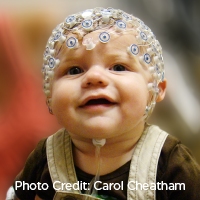
May 16, 2019 | News, Voruganti News
October 17, 2018 – Saroja Voruganti, PhD, has covered a lot of ground in her journey to becoming a faculty researcher in nutrition, genetics, and epidemiology at the UNC Nutrition Research Institute. Born into a traditional south Indian family, she grew up in Delhi in northern India where she graduated with an undergraduate degree in nutrition. Then she married and moved to western India. Even as she focused on marriage, home, and raising a family in the traditional Indian way of life, she kept alive her dream of pursuing advanced studies and contributing outside of family life.

May 16, 2019 | Cheatham News, News, Zeisel News
October 3, 2018 – Choline is present in human milk, and is especially important for fetal and infant development [2,3]. “The hint that choline is important for infant development comes from the fact that in human milk, the supply of choline remains constant across the first year of life,” says Professor Carol Cheatham from the University of North Carolina at Chapel Hill. Other important nutrients, such as docosahexaenoic acid (DHA), are present in large quantities initially, but often level off after a few months.

May 14, 2019 | News
September 28, 2018 – Good Bowls taps into the UNC innovation network and brings locally sourced meals to lower-income consumers. Social innovation is nothing new at the University of North Carolina at Chapel-Hill. And using its long history of social innovation as a cornerstone, one UNC venture is blazing a trail to improve community health. If you haven’t already heard of Good Bowls, you will.

May 13, 2019 | Kohlmeier News, News
September 28, 2018 – This October, the NRI proudly marks its tenth anniversary of delving into the science of Precision Nutrition. What began in 2008 with two faculty members and a supporting staff of nine is, today, a bustling center of scientific inquiry and discovery with a staff of 82, which includes 16 principal investigators.

May 12, 2019 | Hursting News, News
August 30, 2018 – While the link between obesity and breast cancer risk is well known, the underlying mechanisms are not fully understood. Obesity alters many conditions in cells and within the body, and it is not easy to determine which of these conditions are important to the obesity-cancer link. Consequently, it is very difficult to identify potential therapeutic targets.





